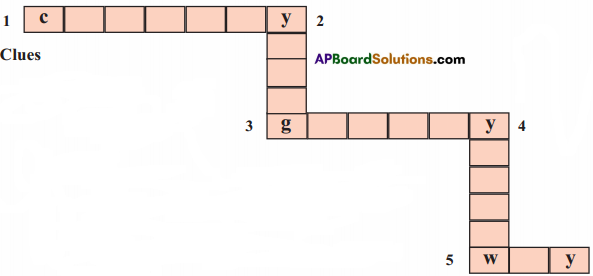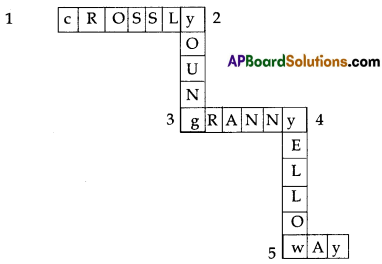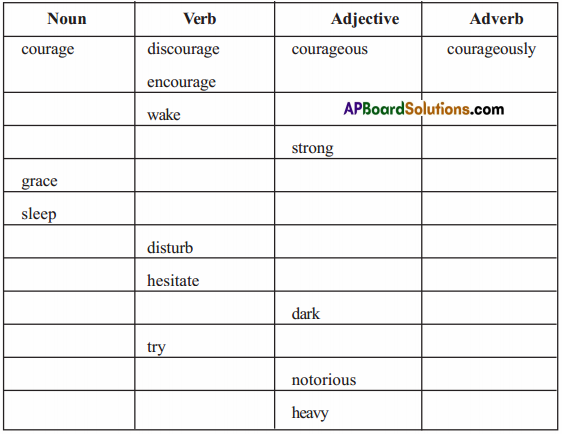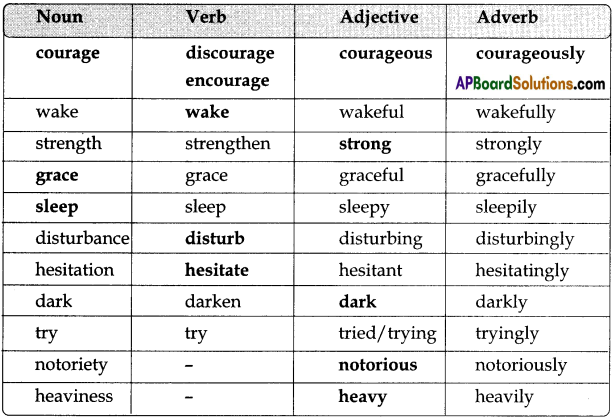Telangana SCERT 7th Class English Guide Pdf Telangana Unit 6A A Hero Textbook Questions and Answers.
TS 7th Class English Guide Unit 6A A Hero
Pre – Reading:
Read the following proverb and answer the questions that follow

Question 1.
You may have heard of this proverb before. Do you know what it means ?
Answer:
The people who are brave will be gained by victory (fortune).
Question 2.
Tell the class why the government rewards the brave and adventurous children?
Answer:
The government rewards the brave and adventurous children because it is an encouragement to such children and an inspiration to all other children.
![]()
Oral Discourse:
Talk on : “Bravery of a boy or a girl who have shown an act of bravery.” (real incidenf/collection from newspaper/magazine/stories)
Answer:
Uday Kiran, a 9 year old boy, was playing with his friends. He saw a three year old boy and his mother slipping into a canal. Uday Kiran immediately jumped into the canal to save them. Kiran tried hard and saved the child. Inspite of all the efforts, he couldnot save the mother. She was washed away by the currents. Kiran was badly wounded. His bravery was recognized and he was awarded the National Bravery Award on the Republic Day by the President.
Comprehension:
Answer the following questions :
Question 1.
According to the news paper’s report who fought with the tiger ?
Answer:
The news paper gave a detailed account of the boy’s fight with the tiger. The boy, who was returning home by jungle path, came face to face with a tiger. He flew up a tree and stayed half a day. At last some people came that way and killed the tiger.
Question 2.
Can you say why Swami’s father read the news for his son ?
Answer:
To get inspiration from the news, Swami’s father read the news for his son.. Moreover he is timid. To avoid his timidity Swami’s father did so.
Question 3.
Did Swami believe the story ? Give reasons for your answer.
Answer:
No, Swami didn’t believe the story because he firmly believed that he would be certainly young and strong. According to his opinion older people have more strength and courage than younger ones.
Question 4.
What did Swami’s father ask him to prove ?
Answer:
Swami’s father asked him to prove his bravery by sleeping alone in his office room instead of beside his grandmother in the porch.
Question 5.
Why did Swami try to change the topic when his father asked him to sleep alone ?
Answer:
He was timid and accustomed to sleep beside his grandmother in the porch. He wanted to make his father forget about his asking Swamy to sleep in the office room alone. So, he changed the topic.
![]()
II. Read the following sentences and say whether they are true or false. Write T for true and F for false statements in the brackets. Correct the false statements.
Question 1.
Swami said that he would sleep alone from the next week. ( )
Answer:
False
True statement – Swami said that he would sleep alone from the first of next month.
Question 2.
Swami’s father looked like a ghost in darkness. ( )
Answer:
True
Question 3.
When Swami was snoring, his grandmother pulled the blanket away. ( )
Answer:
False
True statement – When Swami was snoring, his father pulled the blanket away.
Question 4.
Swami was really afraid of darkness. ( )
Answer:
True
Question 5.
Swami wished that the tiger had killed the boy. ( )
Answer:
True
![]()
III. Tick the correct option to make the sentence true.
Question 1.
Swami was almost faint with fear because ( )
a) his father would beat him
b) he was afraid of ghosts
c) a ghost entered his room
d) he had a terrible dream
Answer:
b) he was afraid of ghosts
Question 2.
Swami clutched the leg of __________ ( )
a) his father
b) his grandmother
c) a chair
d) the thief
Answer:
d) the thief
Vocabulary:
I. Pick out synonyms from the story for each of the following words.
1. clear
2. bravery
3. shameful
4. hide
5. upset
6. argued
7. swore
8. unpleasant
9. tapped
10. damage
Answer:
clear = detailed
bravery = courage
shameful = disgraceful
hide = curled
argued = pleaded
swore = crused
tapped = patted
damage = spoil
upset = pained
unpleasant = painful
![]()
II. Read the conversation given below and fill in the blanks with appropriate words from the box.

Ruchira : I don’t know why the teacher __________ to give his mobile number?
Answer:
hesitated
Suhas : He might be worried that you would __________ him with your phone calls.
Answer:
disturb
Ruchira : I have great __________ for him. I will never behave in a __________ manner.
Answer:
respect, disgraceful
Suhas : I am __________ that our teacher will not give his number. Anyhow, I like your __________. We are all __________ him.
Answer:
certain, courage, afraid of
Ruchira : I don’t think our teacher is __________ but he says everything __________. Once he gave me a wonderful gift so I am always __________ to him.
Answer:
terrible, sternly, grateful
III. Read the following clues given below to complete the word ladder.

Clues:
Question 1.
Sandhya said __________ that she hated him.
Answer:
Crossly
Question 2.
Sridhar is a __________ boy of 10 years old.
Answer:
young
Question 3.
Jyothi used to sleep beside her __________.
Answer:
granny
Question 4.
The garden is full of __________ coloured flowers.
Answer:
yellow
Question 5.
I met my friend Kumar on my __________ home.
Answer:
way
Answer:

![]()
IV. Proverbs:
A proverb is a short sentence, usually known to many people, stating something commonly experienced or giving advice. Here are some English proverbs :
- Tit for tat.
- Where there is a will there is a way.
- A bad workman always blames his tools.
Every language has proverbs. In Telugu we call them ‘saamethalu’. Here is one example from Telugu:
‘kukka kaatuki cheppu debba’. It is important to know the meaning of a proverb before you use it.
Match the parts under A and B to make some proverbs. You can use the clues given within the brackets.
| A | B |
| 1. An apple a day(search for a profession) | a. is a friend indeed. |
| 2. A friend in need (rhymes with need) | b. saves nine. |
| 3. Failure is (search for ‘achievement’) | c. mightier than the sword. |
| 4. A stitch in time (search for a number) | d. keeps the doctor away. |
| 5. The pen is (search for a weapon) | e. the stepping stone to success. |
| 6. Empty vessels (search for noise) | f. the mighty ocean. |
| 7. Little drops of water make | g. seldom bite. |
| 8. Honesty (ends with ‘cy’) | h. while the sun shines. |
| 9. Make hay (search for a star) | i. is the best policy. |
| 10. Barking dogs (search for what dogs do) | j. make much noise. |
Answer:
1. d
2. a
3. e
4. b
5. c
6. j
7. f
8. i
9. h
10. g
![]()
Grammar:
Look at the following sentences from the text.
1. Father was sitting under the lamp and reading the newspaper.
2. He looked over the newspaper.
Sentence 1 is in the Past Continuous Tense form. It conveys that the action was in progress at a particular point of time in the past. In sentence 2, the verb looked is in the Simple Past Tense. It shows that the action was complete in the past.
I. Pick out 5 sentences from the story that use the Simple Past Tense and 5 sentences that use the Past Continuous Tense. Write them down in your notebook.
Simple Past:
1. He looked over the newspaper.
2. The newspaper gave a detailed account of the boy’s fight with the tiger.
3. At last some people came that way and killed the tiger.
4. He tried to change the topic.
5. Swami rose quietly from his place.
Past Continuous:
1. Father was sitting under the hall lamp and reading newspaper.
2. Granny was sitting in her bed.
3. A tiger was chasing him.
4. Something was moving in the darkness.
5. Swami was following the whole conversation from under blanket.
![]()
II. Read the following paragraph and fill in the blanks with the simple past or past continuous forms.
While Swami’s father __________ (read) the newspaper, Swami __________ (listen) to it. His father __________ (ask) him to sleep alone. But he __________ (be) afraid of ghosts. He __________ (want) to sleep in his grandmother’s room. While he __________ (sleep), he __________ (have) a terrible dream. A tiger __________ (chase) him and he __________ (try) to escape.
Answer:
was reading
was listening
asked
was wanted
was sleeping
had chasing
was trying
III. Editing
Read the following passage. Every numbered sentence has an error. Identify and edit it.
(1) Akbar was on his way for the dining room. Hirachand was brought to him. (2) At the same time a messenger come to say that the Queen was ill. (3) Akbar left Hirachand and spent the whole morning by his sick wife. (4) By the time he returned to a dining room, his meal was cold. He ordered a fresh meal. (5) It took so long to get the meal ready that Akbar began to felt ill.
Answer:
1. way to the dining room.
2. a messenger came to say.
3. morning with his sick wife.
4. returned to the dining.
5. began to feel ill.
![]()
Writing:
I. Swami’s classmates, teachers and headmaster congratulated diary him on his courage and bravery. Imagine yourself as Swami and write a diary entry describing your feelings about the appreciation that you have received.
Answer:
September 26,
20xx 9:30 p.m.
Dear diary,
I am very happy today. All my teachers praised me in the class. The headmaster announced my name in the assembly, called me on the dias and made the whole school clap for me. I felt so proud. I have become a hero and the whole school knows me. I didnot know myself that I could do such a brave act. Even my friends told me that I was brave enough to catch a notorious thief. I am elated but at the same time afraid that the thief may take revenge on me but I will try to be brave as I was and I will fight him back.
Bye for today.
Swami.
II. Write a description about an act of bravery that you or your family member or any one of your friends may have shown at some stage in your life.
Answer:
When I was in 6th class I happened to face heart breaking incident. On the occasion of Dasara holidays, I went to my uncle’s house in Punyapur, a small village nearby Wyra. One evening my cousin and I were walking on a bridge. We were enjoying the beautiful scenes. The wind was cool and pleasant.
At that time we saw a car coming with a great speed towards us. We moved aside. In a split of second, the car dashed against the railing of the bridge and fell into the canal. We were in a dazed condition for sometime. My cousin asked me to intimate nearby people and jumped into the canal instantly. He broke the glass of the car with a stone and took out a lad of 7 years from the car.
In the meantime I called the nearby villagers who were working in the field. All of them came to the spot. They also helped my cousin to take out of all the people in the car. By God’s grace all five persons were survived. We felt happy. We were appreciated by the gram sarpanch.
![]()
III. Change the story of “A Hero” into a drama / play use the following ideas to write the script and enact it.
(Group work – Let the students form 3 or 4 groups) (Compering)
- Read Swami’s story once again.
- Identify the characters.
- Pick out the dialogues of the characters.
- Identify the locations of the events.
- Decide scenes and setting accordingly.
- Assign roles to the members of the groups.
- Enact the drama before the whole class.
Answer:
Scene – 1
(Father was reading a newspaper under the hall lamp. Swami sat nearby him)
Father : Swami, Listen to this news item.
Swami : What’s it dad?
Father : A boy fought with a tiger bravely. When he was coming home, he came face to face a tiger in the jungle. He flew up a tree and stayed half a day. Some people who came that way killed the tiger.
Swami : I think, he must have been strong and grown-up person. How could a boy fight a tiger ?
Father : If one has real courage, one can do anything. Courage is everything. Strength and age don’t matter much.
Swami : How can that be? I had a lot of courage but what could I do if a tiger attacked me?
Father : Can you prove you have courage? (said angrily) Sleep in my office alone.
Swami : Father, our captain says we shall have some elders also in our cricket club. He has asked me to tell you.
Father : We’ll see about that later, hereafter, you must sleep alone.
Swami : I’ll sleep alone from the first of next month.
Father : No, you must do it right from today.
You are now in fifth standard. How disgraceful thing it is! Still you want to sleep beside your granny like a child.
Scene – II
(Swami was lying on a bed and covered his face with a blanket)
Granny : Are you really sleepy?
Swami : Please, please, granny! Don’t talk to me.
Father : Get up Swami
Granny : Why do you disturb him?
(Swami got up. Father rolled up his bed, took it under his arm) Father : Come with me.
Swami : Your office room is very dusty and there may be scorpions behind your law books.
Father : There are no scorpions – you can sleep on the bench if you like.
Swami : Can I have a lamp burning in the room?
Father : No, you must be brave. You must not be afraid of darkness.
Swami : Will you atleast leave the door open?
Father : All right, if you roll up your bed and go to your granny’s side at night, I will tell your teacher and make you laughing stock of the whole school.
![]()
Scene – III
(Swami remembered many stories of devils and ghosts he had heard. He spread his bed under the bench and crouched there. He heard a little rustling noise in the room. It was thief)
Swami : What can this be ?
Might it be a devil ?
Will it pull me out and tear me into pieces ?
What’s the use of waiting ?
(Swami crawled out from under bench. He clutched his leg and dug his teeth in)
Thief : Aiyo! Something has bitten me.
Scene – IV
Teacher : Congratulations my boy! You are the real scout.
(At night, father returned home from the club)
Father : Where is the boy?
Mother : He is asleep.
Father : So early!
Mother : He didn’t have a wink of sleep whole of last night.
Father : Where is he sleeping?
Mother : In his usual place.
Father : What a clever boy he is !
Mother : Let him sleep where he likes, you needn’t risk his life again.
Father : All right, pamper him and spoil him as much as you like.
![]()
Study Skills:
Change the words given in the box into different parts of speech. Some words may not have all the forms given in the table. You may use a dictionary if you like.


Answer:

![]()
Listening and Speaking:
Carried Away by an Eagle
We often speak in fun about a bird carrying away a child. A mother might say to her little one, “Don’t be naughty, or a crow will carry you away.” But do such things really happen ?

The following story however, is from real life. The place was a farmhouse near Trondheim in Norway. It was June 1932. A four-year-old child, Svenhild Hansen, was playing in the yard in front of the farmhouse. Suddenly a large eagle came down. It caught hold of the child in its claws and flew up. Lucklily, only the child’s dress was held in his claws, so the child was not hurt.
The big bird carried the child for more than a kilometre. It was flying towards its nest. Eagles build their nests on high rocks. This one’s nest was on the side of a mountain. Growing tired, the bird put the child down on a flat rock. This rock was eight hundred feet high on the side of the mountain. The bird’s nest was just fifty feet away.
But by this time, the child’s mother and father, and a large party of men had set out to look for the child. They noticed the eagle flying round and round over a rock in the mountain. They thought that the child might be there, and climbed quickly to the place. But they did not have much hope that they would find her alive.
When they finally reached there, the little Svenhild was fast asleep. She was not even hurt except for a few scratches.
People say that usually, an eagle kills the animal it catches, before taking it to its nest. Why did’t the eagle kill the child ? We do not know. We can only say that the child was very lucky.
Svenhild is now a grown-up woman. She is married. But she still keeps the torn dress she wore during this amazing adventure.
![]()
I. Your teacher will read the story ‘Carried away by an Eagle’. Listen carefully and answer the following.
Question 1.
How old was the child when she was picked up by the eagle ?
Answer:
The child was four years old, when she was picked up by the eagle.
Question 2.
In which country did the child live when she was picked up by the eagle ?
Answer:
In Norway.
Question 3.
Why did the eagle leave the child on a rock ?
Answer:
As the eagle felt tired, it left the child on a rock.
Question 4.
Why did the eagle fly round and round over the rock ?
Answer:
It wanted to take the child to its nest.
Question 5.
Why do you think that the girl was lucky ?
Answer:
She was not killed by the eagle before it carried her to its nest. So, she was very lucky.
Question 6.
Why do you think Svenhild still keeps the torn dress ?
Answer:
It is a great souvenir for her amazing adventure.
![]()
II. Work in groups and retell the story ‘Carried away by an Eagle’ in your own words.
Answer:
In 1932, in Norway, a four year child Svenhild Hansen was caught hold by an eagle. It took away the baby to the top of a rock near ‘to its nest’.
The child’s parents and a large party of men noticed the eagle flying round over a rock and climbed quickly to the place.
Luckily the child was safe and not hurt except a few scratches. As a sweet memory, Svenhild kept the torn dress though she grew up and married.
![]()
A Hero Summary in English
Father read an incident of a brave boy who fought a tiger. He asked his son about his opinion. Swami, his son said that it was not possible for a boy to fight a tiger however brave he might be. He said that though he was brave, he could not fight a tiger. Father asked him to prove his courage by sleeping alone in his office room. Swami was in the habit of sleeping beside his granny. However much he pleaded, his father made him sleep in the office room without light. He slept under a bench.
At midnight, Swami heard some sounds. As something neared him, he bit the leg. As the knee of the person was bleeding he cried loudly. At once, everyone in the household along with his father, who carried light in his hand came into the office room. They saw a notorious burglar who was handed over to the police. Swami was praised not only by his classmates, teacher and headmaster but also by the police for his bravery. But from next day he slept as usual beside his granny.
Glossary:
crossly (adv) = a little angrily
Usage : My father looked at me crossly.
scowl (n) = an angry look or expression
Usage : I was frightened when I saw a scowl on my father’s face.
porch (n) = a covered entrance to a building; a verandah
Usage : I used to sleep in a porch beside my granny.
sternly (adv) = seriously and strictly
Usage : The teacher looked at the students sternly.
disgraceful (adj) = very bad; shameful
Usage : His disgraceful behaviour stunned us all.
![]()
tiptoed (v) = walked quietly on the tips of his toes
Usage : We tip toed in the room, when my father was sleeping.
curled (v) = drew up his legs close to the body and curved his back
Usage: The boy turned and curled under the blanket.
snoring (v) = breathing roughly and noisely while sleeping
Usage : Some people snore while they are sleeping.
He was snoring in his sleep.
stirred (v) = moved slightly
Usage : A gentle breeze stirred the tender leaves.
groaned (v) = made a deep sad sound
Usage : He groaned with pain.
pleaded (v) = requested
Usage : The students pleaded the Education Minister to conduct physics exam again.
scorpions (n) = small creatures with a poisonous sting in the long tail
Usage : There are so many scorpions in my store room.
laughing-stock = someone or something which seems stupid
Usage : He made himself into a laughing-stock by his foolish activities.
tumbling (v) = falling helplessly
Usage : See there is a stone, you may tumble.
scout (n) = one who is trained in doing acts of public service
Usage : During the high school days, we underwent scout training.
notorious (adj) = well known for some bad quality or act
Usage : Veerappan is a notorious smuggler.
faint (v) = likely to lose consciousness
Usage : She fainted at the sight of the dead body of her husband.
crouched (v) = bent the knees close to the body in fear,
Usage : He crouched at a window.
encased (v) = covered himself closely
Usage : He encased his face with a monkey-cap.
crawled (v) = moved slowly, keeping body close to the ground
Usage : The baby is beginning to crawl.
pamper (v) = to give someone too much attention or love
Usage : you are pampering your children by giving them too many toys.
mumbled (v) = to speak unclearly in a low voice
Usage : The priest mumbled stotras.
jungle = forest
Usage : There are wild animals in the jungle.
coward = not brave
Usage : A coward dies many times.
trembling = shaking with fear
Usage : When I saw a tiger, I trembled with fear.
humbly = obediently
Usage : We must be humble in front of elders
cursed = blamed
Usage : The teacher cursed the student for not doing the homework.
spared = left
Usage : Spare the rod and spoil the child.
effort = trial
Usage : Your income depends on your effort.
hire (v) = to get the use of something for a limited time by making a payment
Usage : He hired a carriage.
storey (n) = section of a building with rooms all at the same level
Usage : The ship had four storeys.
![]()
see off = to say good-bye to somebody who is about to start
Usage : We all went to the airport to see off my uncle.
amusing (adj) = funny and entertaining
Usage : My grandpa used to tell us amusing stories,
curious (adj) = having desire to learn something
Usage : I don’t know the result of last night’s cricket match.
I am curious to know who won.
sea-sickness (n) = feeling nausea (the desire to vomit) to a traveller by a ship
Usage : Some travellers in the ship fall ill of sea-sickness
courteous (adj) = very polite
Usage: The crew members in the ship are courteous.
queries (n) = questions usually based on doubt
Usage : Have I answered your query?
magnificent (adj) = splendid, remarkable
Usage: Mom woke us upto show us the magnificent spectacle of the dawn at the sea.
abundance (n) = in plenty
Usage : Apples grow in abundance in Kashmir
monument (n) = an object (usually a stone building, tower etc.) built to remember a person or an important event.
Usage : A monument erected to soldiers killed in the war.